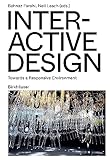Interactive Design : Towards a Responsive Environment / ed. by Behnaz Farahi, Neil Leach.
Material type: TextPublisher: Basel : Birkhäuser, [2023]Copyright date: ©2024Description: 1 online resource (241 p.)Content type:
TextPublisher: Basel : Birkhäuser, [2023]Copyright date: ©2024Description: 1 online resource (241 p.)Content type: - 9783035626889
- 9783035626896
- Behnaz Farahi
- Digitalisierung
- Ineraktives Design
- Iris van Herpen
- Kybernetik
- Neil Leach
- Philip Beesley
- Responsive Architektur
- Responsive Umwelt
- Responsives Design
- Sensorisches Design
- Touchscreen
- DESIGN / General
- Behnaz Farahi
- Interactive design
- Iris van Herpen
- Neil Leach
- Philip Beesley
- design future
- digital enviroment
- digitalization
- intelligent fashion
- interactive art
- responsive architecture
- responsive art
- responsive design
- responsive enviroment
- responsive fashio
- sensory architecture
- sensory art
- sensory design
- sensory enviroment
- sensory fashion
- sensory future
- smart architecture
- smart design
- 006.7
- online - DeGruyter
- Issued also in print.
| Item type | Current library | Call number | URL | Status | Notes | Barcode | |
|---|---|---|---|---|---|---|---|
 eBook
eBook
|
Biblioteca "Angelicum" Pont. Univ. S.Tommaso d'Aquino Nuvola online | online - DeGruyter (Browse shelf(Opens below)) | Online access | Not for loan (Accesso limitato) | Accesso per gli utenti autorizzati / Access for authorized users | (dgr)9783035626896 |
Frontmatter -- Table of Contents -- Preface -- A Brief History of Interactive Architecture -- Part I: From Cybernetics to Interactive Design -- The Architectural Relevance of Cybernetics -- From Cybernetics to Interactive Design -- Architecture, Interaction, Systems -- Adaption: Towards a Theory of Interactivity -- Projects -- A teamLabPlanetsTOKYO, teamLab -- B Border Tuner, Lozano-Hemmer -- C Epiphyte Chamber, Beesley -- D Cerebral Hut, Özel -- Part II: New Kinds of Interaction -- Fragile Architecture: Notes for a New Model of Interaction -- From Cybernetics to Affective Computing in Design -- Neurospace -- Balance, Body Awareness, and Movement in Interactive Experiences -- Projects -- A Ada, Sabin -- B Mirror Mirror, SOFTlab -- C Touch, LAb[au] -- D Eunoia, Park -- Part III: Material Interactivities -- Active Matter -- Activating the Physical Toward Material Experience Design -- Architected Morphing Matter: The Confluence of Geometry and Hidden Forces -- Tomorrowland -- Projects -- A Glowing Nature, Roosegaarde -- B bioLogic, Tangible Media Group, MIT Media Lab -- C Halo, Kimchi and Chips -- D Caress of the Gaze, Farahi -- Part IV: Transdisciplinary Approaches -- Cyberphysical Architecture in the Era of Digital Eclecticism: Transdisciplinarity and Conflation of Technological Milieus -- A New Assemblage: Interactive Art Experiences of a Human-Machine Reality -- Trans-Disciplinary Interactions -- Demystification: The Evolving Design Process of Interactive Architecture -- Projects -- A MegaFaces, Khan -- B Neuro-Architectures, Sciotto -- C Remnant, DigitalIO -- D Petting Zoo, Minimaforms -- Conclusion -- By Way of Conclusion, we Have a Panel Discussion Between Philip Beesley (PB), Guvenc Ozel (GO), and Ruairi Glynn (RG) Led by Behnaz Farahi (BF) -- Image Credits
restricted access online access with authorization star
http://purl.org/coar/access_right/c_16ec
Designer:innen und Vordenker:innen auf dem Gebiet des interaktiven Designs beschreiben Modelle für eine reaktionsfähige Umwelt der Zukunft. Interaktives Design ist in den letzten Jahren mit einer Reihe von inspirierenden Projekten, die ein neues Feld der Forschung und des Designs eröffnet haben, geradezu explodiert. Dieses Buch bringt einige der bedeutendsten Designer:innen und Vordenker:innen auf dem Gebiet des interaktiven Designs zusammen, die mit theoretischen Artikeln unterschiedliche Aspekte der Entwicklung beleuchten und diese anhand von aktuellen Praktiken und Projekten beschreiben. Mit zahlreichen Abbildungen ergänzt, bietet uns das Buch einen Überblick über die Entstehung von interaktivem Design und Architektur auf Basis der Theorie der Kybernetik. Gleichzeitig werden Modelle der Interaktivität vorgestellt, die von dynamischen und formverändernden Materialien über Wearables und Architektur bis zu transdisziplinären und alternativen Designmethoden reichen. Entwicklungsgeschichte des interaktiven Designs Überblick über den Stand der Technik und ihre Möglichkeiten Modelle der Interaktivität in Theorie und Praxis
Designers and forward thinkers in the field of interactive design share their reflections and show examples of different models of a responsive future environment. Interactive design has exploded in recent years with a number of inspiring projects that have opened up a new field of research and design. This book brings together some of the most prominent actors and thinkers in the field of interactive design, with theoretical articles highlighting different aspects of this work and describing them through current practices and projects. Supplemented with numerous illustrations, this book offers an overview of the emergence of interactive design and architecture based on the theory of cybernetics. At the same time, it introduces models of interactivity ranging from dynamic and shapechanging materials to wearables, architecture, and transdisciplinary and alternative design methods. History of the development of interactive design Overview of the state of the art and its possibilities Models of interactivity in theory and practice
Issued also in print.
Mode of access: Internet via World Wide Web.
In English.
Description based on online resource; title from PDF title page (publisher's Web site, viewed 06. Mrz 2024)


